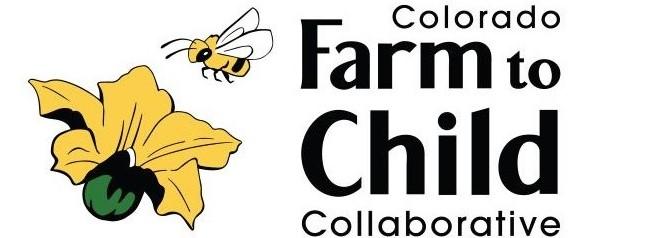Farm to Child
Connecting communities with healthy food
Farm to Child enriches communities' connection with fresh, healthy food by changing food purchasing and education practices in early care and education settings. The three core elements of Farm to Child are:
Local food purchasing
Local foods are purchased, promoted, and served.
Gardening
Children engage in hands-on learning through local gardens.
Education
Children and staff participate in educational activities related to agriculture, food, health, and nutrition.
Farm to Child Success Stories
We're proud of our work in communities throughout Colorado and we invite you to take some time to preview our Farm to Child Success Story videos. The videos are available in English and Spanish with subtitles.
Want to learn more? Visit the Farm to Child YouTube Channel to access the full videos.
Resources
Who was the Farm to Child Guide designed for?
The Farm to Child Guide was designed for:
- early care and education administrators
- teachers
- chefs
- support staff
- parents
- farmers
- community members.
What is the Farm to Child Guide?
The Farm to Child Guide provides a wealth of information, including:
- Farm to Child Program Overview
- Exploring gardening with young children
- Procuring local foods for the child and adult care food program
- Engaging families, staff, and communities
The guide is available in several languages:
Local food purchasing
Purchasing local foods not only supports the community and local economy but also provides centers and homes with fresh, nutritious, and seasonally produced foods. Farm to Child empowers children and their families to make informed food choices while strengthening the local economy and contributing to vibrant communities.
Farm to Child research is beginning to show positive results for children and their families. Meals in centers that focus on serving local food are more nutritious than non-local meal services, especially in fruits and vegetables.
What is a CSA share?
A Community Supported Agriculture (CSA) share is an investment in a local farm at the beginning of the growing season. This investment ensures that our local farmers have funding to begin the season with full fields. As a shareholder, you will receive up to 13 weeks of produce. Each week's shares will consist of the produce that is ready for harvest during that season. Children in care will have the opportunity to try seasonal local produce.
Find a CSA in Colorado
- Colorado Department of Agriculture. (website)
- Colorado Department of Agriculture. (Colorado Department of Agriculture website)
- Colorado Farm Fresh Directory. (available in English and Spanish on the Colorado Proud website)
- Colorado Produce Calendar. (available in English, Spanish, Somali, and Arabic in the Google Drive Folder)
- Colorado Proud. (Colorado Department of Agriculture website)
- CSA guide. (Google doc)
- FarmShare. (FarmShare website)
- Head Start Farm to ECE Overview and Resource Guide. (Excel spreadsheet)
- Local food purchasing guide. (NC State Extension Office website)
- Nourish Colorado Local Food Program Guidebook. (Nourish Colorado website)
- Purchasing local food readiness tool. (Center for Environmental Farming Systems website)
- Receipt templates. (Google Drive folder)
- USDA Procuring Local Foods. (USDA Food and Nutrition Service website)
Gardening
The benefits of green spaces in early childhood care centers are endless. Gardens create positive learning environments, increase children's willingness to try new fruits and vegetables, and serve as a valuable tool for engaging students in many academic subjects. Gardens empower everyone, even little ones, to contribute to the process of growing food from seed to harvest.
Did you know that Colorado Food Program funds can be used to purchase items to grow a garden? For more information:
- Contact your Nutrition Consultant.
- Review the USDA CACFP Procedure Memo 11-2015.
- USDA CACFP Procedure Memo 11-2015. (USDA website)
- Colorado State University - Colorado Master Gardeners. (CSU Extension website)
- Funding opportunities for gardens. (Growing Spaces website)
- National Wildlife Federation and Natural Learning Initiative Resources
- Nature Play at Home. (PDF)
- Jardinería de frutas y hortalizas. (PDF)
- Planning your garden with Master Gardener Julie Pfankuch. (mp4)
- Starting a Sustainable Garden for Child Care Centers and Homes. (mp4)

Listening sessions
The Farm to Child Roadmap includes over 150 listening sessions around the state with diverse groups and audiences. It is a living document that outlines five strategic initiatives:
- Advance and support agency coordination, policy, and funding related to Farm to Child
- Racial, economic, and linguistic justice
- Capacity building and systems coordination to bolster Farm to Child implementation
- Increase the purchasing power of early care and education providers
- Support supply chain partnerships, innovation and technology
The Farm to Child Roadmap is available in:
Gathering feedback
The Farm to Child Collaborative convened twice in September 2023. The meetings included both in-person and virtual feedback platforms to provide updates to the Farm to Child Roadmap. The recommendations and proposed activities are in the Roadmap 2.0.
- Roadmap 2.0. (PDF)
Farm to Child Collaborative
Sign up to join the Farm to Child Collaborative to gain insight and share your Early Childhood Education (ECE) experiences with a growing group of individuals working to enhance Farm to Child efforts in Colorado. You'll be added to the email listserv and receive meeting invitations.
- Farm to Child Collaborative Email List. (Google Form)
Colorado's Farm to Child initiative envisions a state where fresh produce and other nutritious foods from local farms are an essential component of strong and just local and regional food systems.
New member orientation
Learn about the Farm to Child Collaborative and how to get involved:
- New Member Orientation video. (mp4)
Roadmap guides and actionable steps
The Colorado Farm to Child Collaborative developed the Colorado Farm to Child Roadmap to better coordinate resources and guide collective action around these efforts. The Collaborative, a diverse group of producers, care providers, organizations, state agency representatives, school districts, and others all working together to bring local produce to children, outlined a list of Work Plan Priorities to accelerate Colorado’s Farm to ECE progress.
The Farm to Child Roadmap initiative's webpages for ECE providers, farmers and producers, and partner organizations provide guidance on successfully participating in Farm to Child. We encourage you to explore all of the webpages, no matter what your role is.
Education
Not only is Farm to Child a wonderful way for children to learn about the environment and how food grows, but it also teaches self-reliance, the importance of community, and hands-on STEM concepts. Learning about growth and renewal builds optimism and positivity.
Farm to Child has shown a positive impact in:
- child engagement and development.
- academic achievement.
- family, educator, and staff engagement.
Quick Bites videos
- Quick Bites Videos are available in English and Spanish in the Google Drive folder. Subjects include:
- Food Safety
- Time and Temperature Abuse
- Flow of Food
- Environmental Hazards
- Mise en Place
- Recipes, Steps, and Conversions
- Whiteboards
- Time Management
Knife Skills Training
Nourish Colorado Knife Skills training with Chef Fez is available in English and Spanish.
Course materials
- Learn more about deciding whether or not to use disposables.
- The USDA Institute of Child Nutrition's guidance on disposable gloves.
- How to properly use disposable gloves, English. (USDA Institute of Child Nutrition website)
- How to properly use disposable gloves, Spanish. (USDA Institute of Child Nutrition website)
- How to properly wash your hands
- How to properly temp food
- Temperature
- Good receiving practices
- Proper refrigeration storage
- Internal cooking temperatures
- Contaminants
- Contaminants, English. (PDF)
- Contaminants, Spanish. (PDF)
- Mise en place
- Mise en place, English. (PDF)
- Mise en place, Spanish. (PDF)
- Recipe conversion tips
- Recipe reading
- Blank whiteboard
- Blank whiteboard, English. (PDF)
- Blank whiteboard, Spanish. (PDF)
- Time management
- Time management, English. (PDF)
- Time management, Spanish. (PDF)
- Farm to Child Self-assessment
- Grow it, try it, Like it! (USDA Food and Nutrition Service website)
- 2014 Harvest for Healthy Kids. USDA Food and Nutrition Service website)
- National Farm to School Network. (National Farm to School Network website)
- Pint-Size Produce. (Renewing the Countryside website)
- Seeds to Success. (The Louisiana Farm to School Program website)
20 on Tuesdays
20 on Tuesdays are a series of 20-minute videos to help educate people about various Farm to Child components and help ECE professionals better understand the tools, resources, and skills needed to start a Farm to Child program at their site.
Colorado data
In the spring of 2023, the Colorado Department of Public Health and Environment released the Statewide Farm to Child survey. This survey examined the participation of different types of child care sites in Colorado, as well as the perceived benefits and challenges associated with the core activities of gardening, local food purchasing, and nutrition and agriculture education.
Key survey takeaways
The 2023 Colorado Farm to Child Statewide Survey examined the participation of different types of sites in Colorado, and the perceived benefits and challenges associated with the core activities of gardening, local food purchasing, and
nutrition and agriculture education. The 2023 Colorado Farm to Child Statewide Survey infographic illustrates key takeaways from the survey results.
Grant Resources
Grants are a crucial part of funding the Farm to Child program in Colorado. Writing a grant application takes time, skill, and knowledge of individual grant requirements. Our resources will help you increase access to funding opportunities, improve grant writing skills, and learn how to apply data to showcase the need for your program.
Open Source Funding and Resource List
There are many ways to fund food systems projects that support Farm to Child creatively. The Funding and Resource List is a living document where anyone can add new grant information throughout the year.
- Open Source Funding and Resource List. (Google Sheet)
Using Data in Grant Writing Resource
Using data n Colorado-specific data helps to illustrate the need, sustainability, and examples of past success when applying for grants. The Using Data in Grant Writing resource connects the 2023 data to other data resources that help to highlight the need and impact of Farm to Child in your community. It is divided into three sections:
- Key data takeaways from the 2023 Colorado Farm to Child Statewide Survey
- Examples of how to use the data as an Early Care and Education Site for grant writing purposes
- Additional resources for grant writing
You can use the Using Data in Grant Writing Resource guidelines to include the 2023 data in grant applications, based on the type of site you operate and whether you participate in the Colorado Food Program.
- Using Data in Grant Writing Resource. (Google Doc)
